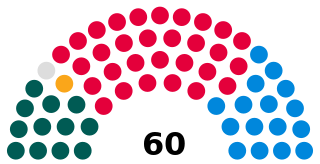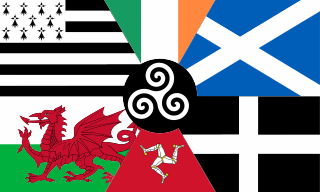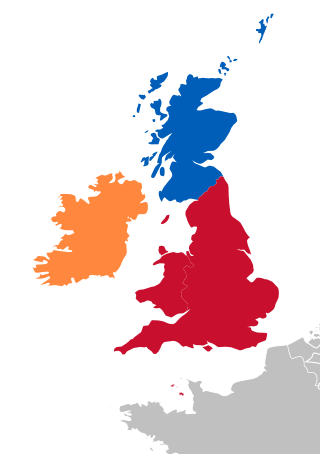Plaid Cymru is a centre-left to left-wing, Welsh nationalist political party in Wales, committed to Welsh independence from the United Kingdom.

The Senedd, officially known as the Welsh Parliament in English and Senedd Cymru in Welsh, is the devolved, unicameral legislature of Wales. A democratically elected body, it makes laws for Wales, agrees certain taxes and scrutinises the Welsh Government. It is a bilingual institution, with both Welsh and English being the official languages of its business. From its creation in May 1999 until May 2020, the Senedd was known as the National Assembly for Wales.
Regionalism is a political ideology that seeks to increase the political power, influence, and/or self-determination of the people of one or more subnational regions. It focuses on the "development of a political or social system based on one or more" regions and/or the national, normative or economic interests of a specific region, group of regions or another subnational entity, gaining strength from or aiming to strengthen the "consciousness of and loyalty to a distinct region with a homogeneous population", similarly to nationalism. More specifically, "regionalism refers to three distinct elements: movements demanding territorial autonomy within unitary states; the organization of the central state on a regional basis for the delivery of its policies including regional development policies; political decentralization and regional autonomy".

Welsh nationalism emphasises and celebrates the distinctiveness of Welsh culture and Wales as a nation or country. Welsh nationalism may also include calls for further autonomy or self determination which includes Welsh devolution, meaning increased powers for the Senedd, or full Welsh independence.

Politics in Wales forms a distinctive polity in the wider politics of the United Kingdom, with Wales as one of the four constituent countries of the United Kingdom (UK).

English independence is a political stance advocating secession of England from the United Kingdom. Support for secession of England has been influenced by the increasing devolution of political powers to Scotland, Wales and Northern Ireland, where independence from the United Kingdom is a prominent subject of political debate.
Welsh Labour is the branch of the United Kingdom Labour Party in Wales and the largest party in modern Welsh politics. Welsh Labour and its forebears won a plurality of the Welsh vote at every UK general election since 1922, Senedd election since 1999, and European Parliament election in 1979–2004 and 2014. Welsh Labour holds 22 of the 40 Welsh seats in the UK Parliament, 30 of the 60 seats in the Welsh Senedd and 576 of the 1,264 councillors in principal local authorities, including overall control of 10 of the 22 principal local authorities.
The Royal Commission on the Constitution, also referred to as the Kilbrandon Commission or Kilbrandon Report, was a long-running royal commission set up by Harold Wilson's Labour government to examine the structures of the constitution of the United Kingdom and the British Islands and the government of its constituent countries, and to consider whether any changes should be made to those structures. It was started under Lord Crowther on 15 April 1969, Lord Kilbrandon took over in 1972, and it finally reported on 31 October 1973.

Welsh independence is the political movement advocating for Wales to become a sovereign state, independent from the United Kingdom.
Glyndwr Cennydd Jones is a chief executive officer, education professional, writer on constitutional matters, and former political candidate.

Plaid Cymru; The Party of Wales originated in 1925 after a meeting held at that year's National Eisteddfod in Pwllheli, Caernarfonshire. Representatives from two Welsh nationalist groups founded the previous year, Byddin Ymreolwyr Cymru and Y Mudiad Cymreig, agreed to meet and discuss the need for a "Welsh party". The party was founded as Plaid Genedlaethol Cymru, the National Party of Wales, and attracted members from the left, right and centre of the political spectrum, including both monarchists and republicans. Its principal aims include the promotion of the Welsh language and the political independence of the Welsh nation.
Full fiscal autonomy (FFA) – also known as devolution max, devo-max, or fiscal federalism – is a particular form of far-reaching devolution proposed for Scotland and Wales. The term has come to describe a constitutional arrangement in which instead of receiving a block grant from the UK Exchequer as at present, the Scottish Parliament or the Senedd would receive all taxation levied in Scotland or Wales; it would be responsible for most spending in Scotland or Wales but make payments to the UK government to cover Scotland or Wales's share of the cost of providing certain UK-wide services, largely defence and foreign relations. Scottish/Welsh fiscal autonomy – stopping short of full political independence – is usually promoted by advocates of a federal United Kingdom.

A Celtic union refers to political unity between the Celtic nations.

In the United Kingdom, devolution is the Parliament of the United Kingdom's statutory granting of a greater level of self-government to the Scottish Parliament, the Senedd, the Northern Ireland Assembly and the London Assembly and to their associated executive bodies the Scottish Government, the Welsh Government, the Northern Ireland Executive and in England, the Greater London Authority and combined authorities.

Unionism in Wales is the political view that supports a political union between Wales and the other countries of the United Kingdom. As well as the current state of the UK, unionism may also include support for Federalism in the United Kingdom and a United Kingdom Confederation.

Federalism in the United Kingdom refers to the concept of constitutional reform, where there is a division of legislative powers between two or more levels of government, therefore sovereignty is non-centralised between a federal government and autonomous governments in a federal system.

The hypothetical break up of the United Kingdom of Great Britain and Northern Ireland following departure of Scotland is mentioned in media and think tanks with regard to potential Scottish independence. The union of the Kingdom of Scotland and Kingdom of England into the Kingdom of Great Britain was formed in 1707. The union of the Kingdom of Great Britain with the Kingdom of Ireland was formed in 1801, to establish the United Kingdom of Great Britain and Ireland. Most of Ireland left in 1922, whereupon the UK became the United Kingdom of Great Britain and Northern Ireland.

Welsh devolution is the transfer of legislative power for self-governance to Wales by the Government of the United Kingdom. Wales was conquered by England during the 13th century; the 1284 Statute of Rhuddlan caused Wales to lose its de facto independence and formed the constitutional basis for it as a principality in the "Realm of England". The Laws in Wales Acts 1535 and 1542 applied English law to Wales and united the Principality and the Marches which effectively ended both and incorporated Wales into England. The Wales and Berwick Act 1746 defined "England" to include Wales until the Welsh Language Act 1967, which separated Wales from England within the sovereign state of the United Kingdom.
There have been various proposals for constitutional reform in the United Kingdom.

A referendum on Welsh independence from the United Kingdom (UK) has been proposed by pro-independence supporters, including independence campaign group YesCymru, political parties Plaid Cymru and Wales Green Party and other groups and individuals.












